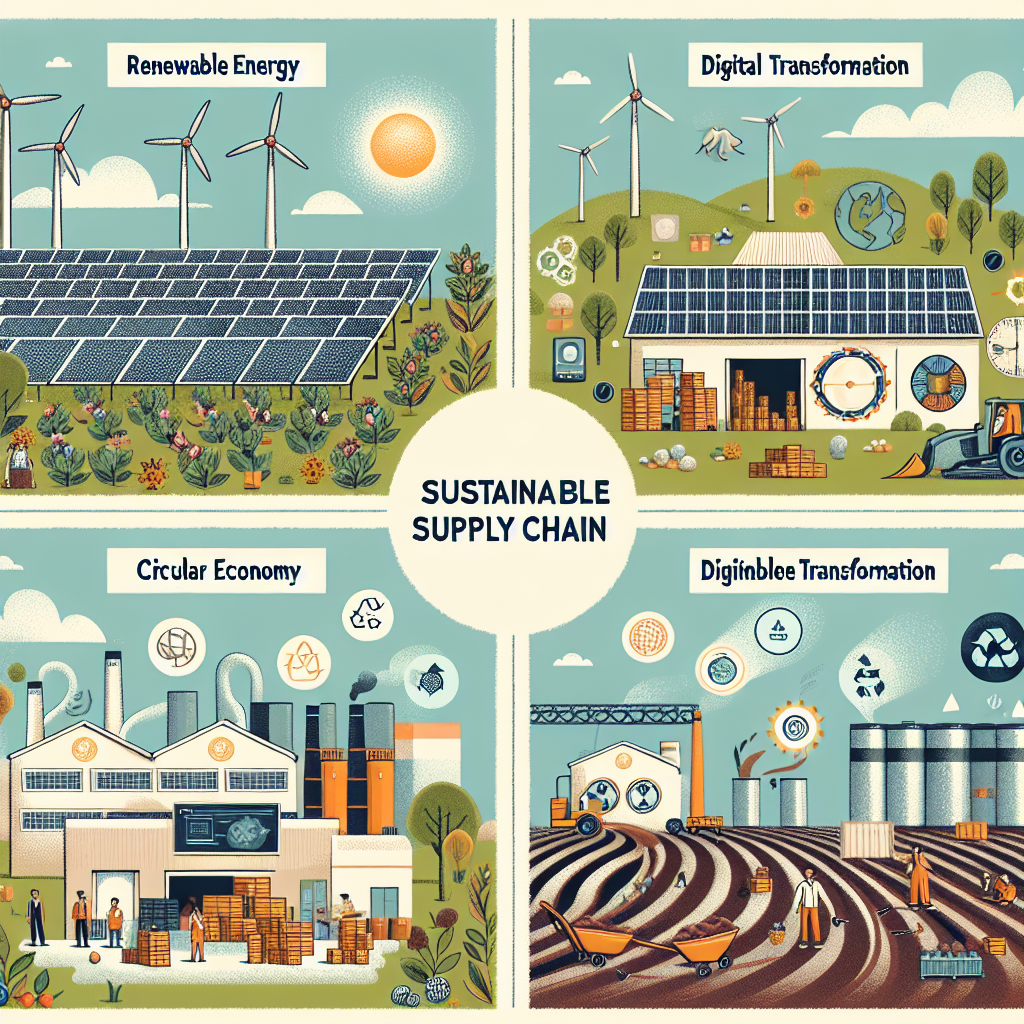Sustainable Supply Chains: Key Trends for Eco-Conscious Businesses

Sustainable Supply Chains: Key Trends for Eco-Conscious Businesses
As environmental awareness continues to reshape consumer behaviors and corporate policies, sustainable supply chains have emerged as both a business imperative and a competitive advantage. Eco-conscious companies are redefining their strategies, partnerships, and operations to minimize environmental impact while maximizing ethical value. Here, we explore the most significant trends influencing sustainable supply chains in 2024 and how businesses can embrace them for a greener future.
1. Transparency and Traceability
One of the most prominent trends in sustainable supply chains is the demand for transparency. Stakeholders—consumers, regulators, and investors—are increasingly expecting businesses to disclose where their products come from and how they are made. Advanced technologies like blockchain and IoT sensors are enabling real-time tracking of materials from origin to final delivery, ensuring accountability and reducing risks of unethical practices such as child labor or environmental harm. Companies are now investing in traceability platforms to map their supply chains, help meet regulatory requirements, and build consumer trust.
2. Supplier Collaboration and Engagement
Sustainability can’t be achieved in isolation. A growing trend is the cultivation of closer, more collaborative relationships with suppliers. Businesses are working jointly with their suppliers to set clear environmental standards, share best practices, and provide training or incentives for sustainability improvements. This collaborative approach is driving collective action on energy use, emissions, and resource management, making entire supply chains cleaner and more resilient.
3. Circular Economy Integration
Increasingly, supply chain leaders are moving toward circular economy principles—designing out waste, keeping products and materials in use, and regenerating natural systems. Businesses are now considering the full lifecycle of their products, including recovery, remanufacturing, and recycling solutions. Returnable packaging, product take-back schemes, and the use of recycled materials are examples of circular initiatives gaining momentum across industries, from electronics to fashion.
4. Carbon Footprint Reduction
Cutting carbon emissions in the supply chain is front and center for eco-conscious businesses. This includes switching to low-carbon transport modes, optimizing logistics for efficiency, employing renewable energy sources in manufacturing, and adopting carbon accounting tools. Supply chain decarbonization is not only good for the planet, but it’s also increasingly expected by regulators and consumers alike. Many leading companies are now setting science-based targets and reporting progress transparently.
5. Local Sourcing and Shorter Supply Chains
Global disruptions have highlighted the value of localized, shorter supply chains. Local sourcing reduces transportation emissions, supports regional economies, and often allows for stronger supplier relationships and quality control. Businesses are rethinking global procurement models and, where possible, choosing regional suppliers and manufacturers to decrease their overall environmental footprint and risk exposure.
6. Responsible Sourcing of Raw Materials
Eco-conscious companies are going beyond cost and speed and prioritizing the sourcing of raw materials that are certified, renewable, or responsibly managed. This includes fair trade commodities, FSC-certified wood, recycled metals, or organic fibers. Responsible sourcing minimizes environmental degradation and respects workers’ rights, helping businesses stand out in the eyes of socially-aware customers.
7. Technology and Data-Driven Solutions
Innovative technologies are accelerating sustainability transformations in supply chains. Artificial intelligence helps optimize routes and inventory, reducing waste and emissions. Big data analytics enable detailed risk assessments and continuous improvement, while digital twins help model various supply chain scenarios for maximum eco-efficiency. Investing in technology provides actionable insights and enables companies to scale climate action effectively.
8. Green Logistics and Packaging
From electric vehicle fleets to biodegradable packaging, businesses are revamping logistics and packaging to align with environmental goals. Sustainable packaging—minimalist, recyclable, or compostable—reduces waste and appeals to conscious consumers. Green logistics choices like route planning, consolidated shipments, and alternative fuels are slashing supply chain emissions and costs.
9. Ethical Labor and Social Considerations
A sustainable supply chain is not just about ecology; it’s also about social impact. Fair wages, safe working conditions, diversity, and community engagement are crucial components. Companies are increasingly screening suppliers for ethical standards and supporting social programs that uplift workers and communities, leading to a more holistic approach to sustainability.
10. Regulatory Compliance and Reporting
New environmental and social regulations are being enacted worldwide, pushing companies to comply or face reputational and financial consequences. Proactive businesses are preparing for incoming rules, such as extended producer responsibility (EPR) and due diligence laws, by adopting robust reporting practices and integrating sustainability into governance frameworks.
Moving Forward: Embracing Sustainability as a Business Strategy
Building a sustainable supply chain is a journey requiring commitment, innovation, and collaboration. For eco-conscious businesses, prioritizing these key trends isn’t just about compliance—it’s about future-proofing the business, strengthening stakeholder relationships, and making a real difference for people and the planet. As sustainability becomes a central pillar of supply chain management, those who take decisive action today will be the leaders of tomorrow.
* The post is written by AI and may contain inaccuracies.




